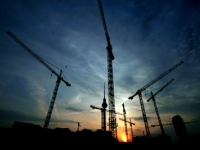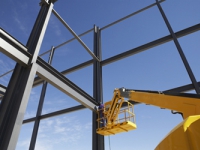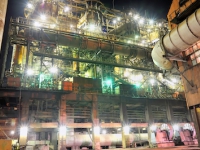Spending slips in May but rises year-to-date; surveys find divergent material pricesEditor’s note: Construction Citizen is proud to partner with AGC America to bring you AGC Chief Economist Ken Simonson's Data DIGest. Check back each week to get Ken's expert analysis of what's happening in our industry.Construction spending in May totaled $1.143 trillion at a seasonally adjusted annual rate, down 0.8% from April but up 2.8% year-over-year, the Census Bureau reported on Friday. Monthly levels for January-April were revised up by $18-23 billion (1.6-2.0%), and levels for 2014 and 2015 were also revised. Unusually mild winter weather and extremely rainy weather in parts of the country in May might have thrown off monthly totals. Combined January-May year-to-date (YTD) spending was 8.2% higher than in the same months of 2015. Public construction dropped 2.3% for the month but climbed 3.8% YTD.
Most metros add jobs through May; NAHB finds widespread craft-worker shortagesEditor’s note: Construction Citizen is proud to partner with AGC America to bring you AGC Chief Economist Ken Simonson's Data DIGest. Check back each week to get Ken's expert analysis of what's happening in our industry.Construction employment, not seasonally adjusted, increased from May 2015 to May 2016 in 227 (63%) of the 358 metro areas (including divisions of larger metros) for which BLS provides construction employment data, decreased in 83 (23%) and was stagnant in 48, according to an AGC release and map on Wednesday. (BLS combines mining and logging with construction in most metros.) The Anaheim-Santa Ana-Irvine, Calif. division again added the most jobs during the past year (14,700 construction jobs, 17%), followed by Orlando-Kissimmee-Sanford (9,700 construction jobs, 16%); and Phoenix-Mesa-Scottsdale (7,200 construction jobs, 7%). The largest percentage gains again occurred in Monroe, Mich. (30%, 700 combined jobs), followed by Urban Honolulu (20%, 4,900 combined jobs), Anaheim-Santa Ana-Irvine and the Miami-Miami Beach-Kendall division (17%, 6,800 construction jobs).
July 05, 2016
Construction employment rises in 39 states; ConstructConnect, ABI signal more growthEditor’s note: Construction Citizen is proud to partner with AGC America to bring you AGC Chief Economist Ken Simonson's Data DIGest. Check back each week to get Ken's expert analysis of what's happening in our industry.Seasonally adjusted construction employment rose in 39 states from May 2015 to May 2016 and declined in 11 states and the District of Columbia, an AGC analysis of Bureau of Labor Statistics (BLS) data released on Friday showed. California again added the most jobs (39,600, 5.5%), followed by Florida (29,400, 6.9%) and Georgia (13,400, 8.1%). The highest percentage gains again occurred in Hawaii (20%, 6,700 jobs), Iowa (13%, 10,400) and Nevada (10%, 6,900). North Dakota again lost the highest percentage of construction jobs, followed by West Virginia (-8.0%, -2,700), Kansas (-5.6%, -3,400), Wyoming (-5.2%, -1,200) and Alaska (-5.0%, -900). North Dakota also led again in number of jobs lost, followed by Kansas, Pennsylvania (-2,900, -1.2%) and West Virginia.
June 27, 2016
Construction input PPIs decline year-over-year but rise in May; more hikes appear likelyEditor’s note: Construction Citizen is proud to partner with AGC America to bring you AGC Chief Economist Ken Simonson's Data DIGest. Check back each week to get Ken's expert analysis of what's happening in our industry.The producer price index (PPI) for final demand in May, not seasonally adjusted, increased 0.3% from April but fell 0.1% year-over-year (y/y) from May 2015, the Bureau of Labor Statistics (BLS) reported on Wednesday. AGC posted tables and an explanation focusing on construction prices and costs. Final demand includes goods, services and five types of nonresidential buildings that BLS says make up 34% of total construction. The PPI for final demand construction, not seasonally adjusted, increased 0.1% for the month and 1.9% y/y. The PPI for new nonresidential building construction—a measure of the price that contractors say they would charge to build a fixed set of five categories of buildings—also rose 1.9% y/y. Changes ranged from 1.2% y/y for industrial building construction to 1.6% for healthcare buildings, 1.9% for schools, 2.1% for office buildings, and 2.7% for warehouses.
June 20, 2016
Employment falls in April, May but April openings rise; various materials prices increaseEditor’s note: Construction Citizen is proud to partner with AGC America to bring you AGC Chief Economist Ken Simonson's Data DIGest. Check back each week to get Ken's expert analysis of what's happening in our industry.Nonfarm payroll employment in May increased by 38,000, seasonally adjusted, from March and by 2,398,000 (1.7%) over 12 months, the Bureau of Labor Statistics (BLS) reported on Friday. The unemployment rate declined to 4.7% from 5.0% in April. Construction employment dropped by 15,000 for the month (to 6,645,000) but increased by 219,000 (3.4%) year-over-year (y/y). The estimated change for April was revised from +5,000 to -1,000. Residential construction employment (residential building and specialty trade contractors) decreased by 4,400 for the month but rose by 127,700 (5.2%) y/y. Nonresidential employment (nonresidential building, specialty trades, and heavy and civil engineering construction) shrank by 10,300 for the month but increased by 91,400 (2.3%) y/y.
June 13, 2016
Spending falls in April but rises year-to-date; Beige Book finds increasing demand, costsEditor’s note: Construction Citizen is proud to partner with AGC America to bring you AGC Chief Economist Ken Simonson's Data DIGest. Check back each week to get Ken's expert analysis of what's happening in our industry.Construction spending in April totaled $1.133 trillion at a seasonally adjusted annual rate, down 1.8% from March but up 4.5% year-over-year, the Census Bureau reported on Wednesday. The March level was revised up by an unusually large $18 billion (1.6%). The March-to-April decline may reflect "payback" after a mild winter that enabled contractors to do work that normally wouldn't occur before spring. Combined January-April year-to-date (YTD) spending was 8.7% higher than in the same months of 2015. Public construction dropped 2.8% for the month but climbed 6.1% YTD. The largest public component, highway and street construction, fell 0.4% for the month but increased 13% YTD. The other major public segment, educational construction, fell 2.5% for the month but rose 10% YTD. Private residential spending declined 1.5% in April but increased 9.3% YTD.
June 03, 2016
Dodge, ConstructConnect diverge on construction starts trend; PPIs rise in AprilEditor’s note: Construction Citizen is proud to partner with AGC America to bring you AGC Chief Economist Ken Simonson's Data DIGest. Check back each week to get Ken's expert analysis of what's happening in our industry.Two firms that collect data on the value of new construction starts issued starkly different assessments of April and year-to-date (YTD) starts for the first four months of 2016 combined compared to year-ago periods. April starts slumped 8% from March's level at a seasonally adjusted annual rate, Dodge Data & Analytics reported on Wednesday. "Nonresidential building pulled back [-19%] following its sharp March increase, and residential building also declined [-8%] due to a slower pace for multifamily housing. Meanwhile, the nonbuilding construction sector showed improvement [+10%], with public works strengthening after its lackluster March performance. Through the first four months of 2016, total construction starts on an unadjusted basis were reported...down 12% from...a year ago.
May 23, 2016
Employment stalls in April but remains strong year-over-year; spending rises in MarchEditor’s note: Construction Citizen is proud to partner with AGC America to bring you AGC Chief Economist Ken Simonson's Data DIGest. Check back each week to get Ken's expert analysis of what's happening in our industry.Nonfarm payroll employment in April increased by 160,000, seasonally adjusted, from March and by 2,682,000 (1.9%) over 12 months, and the unemployment rate held steady at 5.0%, the Bureau of Labor Statistics (BLS) reported on Friday. Construction employment rose by 1,000 for the month (to 6,670,000) and by 261,000 (4.1%) year-over-year (y/y). Industry employment reached the highest level since December 2008.
May 11, 2016
March data shows 12-month job gains in two-thirds of metros; highest pay rise since 2008Editor’s note: Construction Citizen is proud to partner with AGC America to bring you AGC Chief Economist Ken Simonson's Data DIGest. Check back each week to get Ken's expert analysis of what's happening in our industry.Construction employment, not seasonally adjusted, increased from March 2015 to March 2016 in 244 (68%) of the 358 metro areas (including divisions of larger metros) for which the Bureau of Labor Statistics (BLS) provides construction employment data, decreased in 70 (20%) and was stagnant in 44, according to an AGC release and map on Wednesday that analyzed BLS data. (BLS combines mining and logging with construction in most metros.) The Anaheim-Santa Ana-Irvine, Calif. division again added the most jobs during the past year (11,900 construction jobs, 14%), followed by New York City (9,000 combined jobs, 7%); Atlanta-Sandy Springs-Roswell (8,500 construction jobs, 8%); and Orlando-Kissimmee-Sanford (8,300 construction jobs, 14%). The largest percentage gains occurred in El Centro, Calif. (45%, 1,000 combined jobs); Monroe, Mich. (36%, 800 combined jobs); and Haverhill-Newburyport-Amesbury Town, Mass.-N.H. (28%, 1,000 combined jobs).
May 02, 2016
Building products volumes rise, results vary for prices; nonresidential starts increaseEditor’s note: Construction Citizen is proud to partner with AGC America to bring you AGC Chief Economist Ken Simonson's Data DIGest. Check back each week to get Ken's expert analysis of what's happening in our industry.Securities research firm Thompson Research Group on April 12 released its quarterly building products survey of select manufacturers and distributors with more than 300 locations nationwide "on the state of the residential and nonres[identical] construction end markets....A common theme from all contacts was...a tight labor market along the value chain (truck driver shortages to drywall installers)....Overall nonres volumes are projected to be up mid-to-high single digits, depending upon the industry contact. Earlier construction value chain feedback is for 6-8% [increase in] volumes...Other contacts with a wider range of early and later cycle nonres products cite a...4-6% range. Healthcare end market remains strong, and office growth is also driving demand. Not surprisingly, industry contacts confirm that the multifamily end market growth rates are likely to slow in 2016 [to] (small single digits growth).
April 26, 2016






















